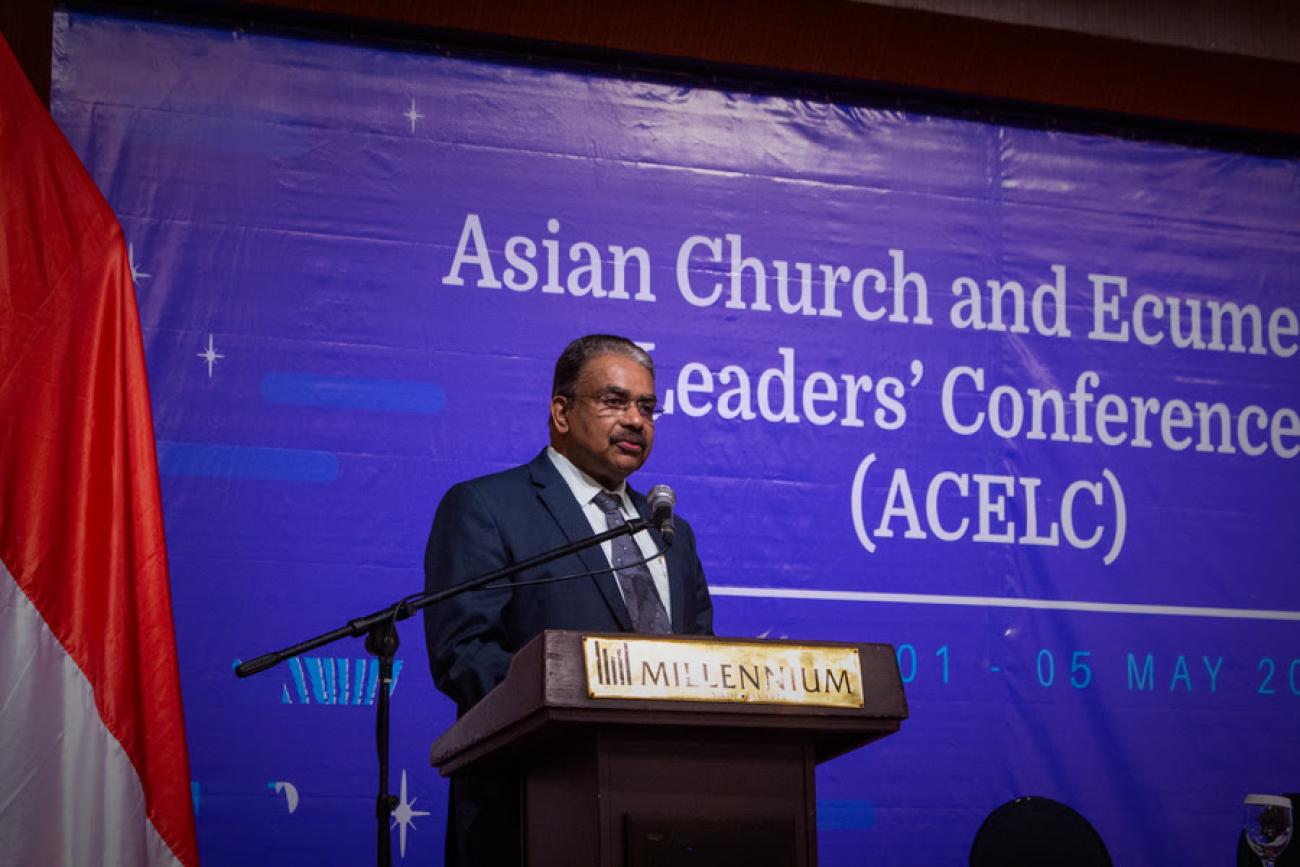“Has the ecumenical movement become more divisive and less effective?” asks CCA General Secretary at ACELC

Dr Mathews George Chunakara, the CCA General Secretary, delivers the ACELC Thematic Address on ‘The Changing Ecclesial and Ecumenical Landscape in Asia: Our Common Witness and Ecumenical Accompaniment’
Jakarta, Indonesia: Speaking to an audience consisting of international and national Indonesian church and ecumenical leaders on ‘The Changing Ecclesial and Ecumenical Landscape in Asia: Our Common Witness and Ecumenical Accompaniment’, the CCA General Secretary Dr Mathews George Chunakara raised the question, “Has the ecumenical movement become more divisive and less effective?”
More than one hundred heads of churches—primates, bishops, presidents, general secretaries, and moderators—as well as general secretaries of national councils of churches in Asia, are attending the high-level summit, the Asian Church and Ecumenical Leaders’ Conference (ACELC).
Delivering the first thematic address at the ACELC being held at the Millennium Hotel in Indonesia’s capital city, Jakarta, the CCA General Secretary situated the thematic address in the context of Christianity in Asia and the several challenges faced by the Asian ecumenical movement, such as increasing denominationalism, resistance to the call to wider fellowship, a tendency to revive and promote specific ecclesial or confessional groupings and identities, a multiplicity of ecumenical organisations and structures, a lack of vision and commitment on part of Asian leaders to promote ecumenism, and a lack of interest in the ecumenical formation of the younger generation.
The issue was raised in the context of the replication or duplication of efforts from a myriad of ecumenical organisations that address the same concerns within the same constituencies without any coordination or sharing of information, which detracts from the overall intended outcomes and negatively affects the coherence of the ecumenical movement. Such a trend was causing what the CCA General Secretary termed ‘archipelago ecumenism’—where such bodies or ecumenical coalitions that parachuted from outside Asia are responsible for disunity rather than being committed to strengthening or promoting conciliar unity.
Another key point raised was the rise in unnamed churches and para-churches or freelance aggressive missionary evangelism that was causing further fragmentation of the Asian ecumenical movement and giving rise to ‘missionary battlefields’ with ‘aggressive evangelisation tactics’ promoted in countries such as Cambodia, Nepal, Bhutan, and Mongolia.
The CCA General Secretary hearkened to former times when the Asian churches provided stalwart leadership and enriching contributions to the global ecumenical movement. He called upon Asian churches to pool resources together and engage with sister churches at local and national levels, rather than more enthusiastically relating only with former partners in the mission fields.
“The specific responsibility and role of the Asian churches and the ecumenical movement in Asia, as a whole, is to search for the expression of the Asian churches’ common faith through their engagement in a pluralistic Asia and to work for visible unity at national and regional levels despite doctrinal differences or confessional barriers. A new way of working together by all ecumenical actors and denominational and confessional bodies engaged in their mission in Asia has to be found,” said the CCA General Secretary.
“The need for revitalising the ecumenical movement in Asia and regaining the ecumenical vision of Asian churches should be a priority of all those who are concerned with the common witness and future of the ecumenical movement in Asia. It is high time that the Asian churches began thinking about how best they can contribute to revitalising the Asian ecumenical movement so as to reposition its role and respond to the challenges of contemporary Asian realities,” concluded Dr Mathews George Chunakara.
Comments and insights were shared by Rev. Jacky Manuputty, the General Secretary of the Communion of Churches in Indonesia, Bishop Dushantha Rodrigo of the Church of Ceylon, and Rev. David Das, the General Secretary of the National Council of Churches in Bangladesh.
The ACELC is being held from 1 to 5 May 2023.
More photos can be found here.










